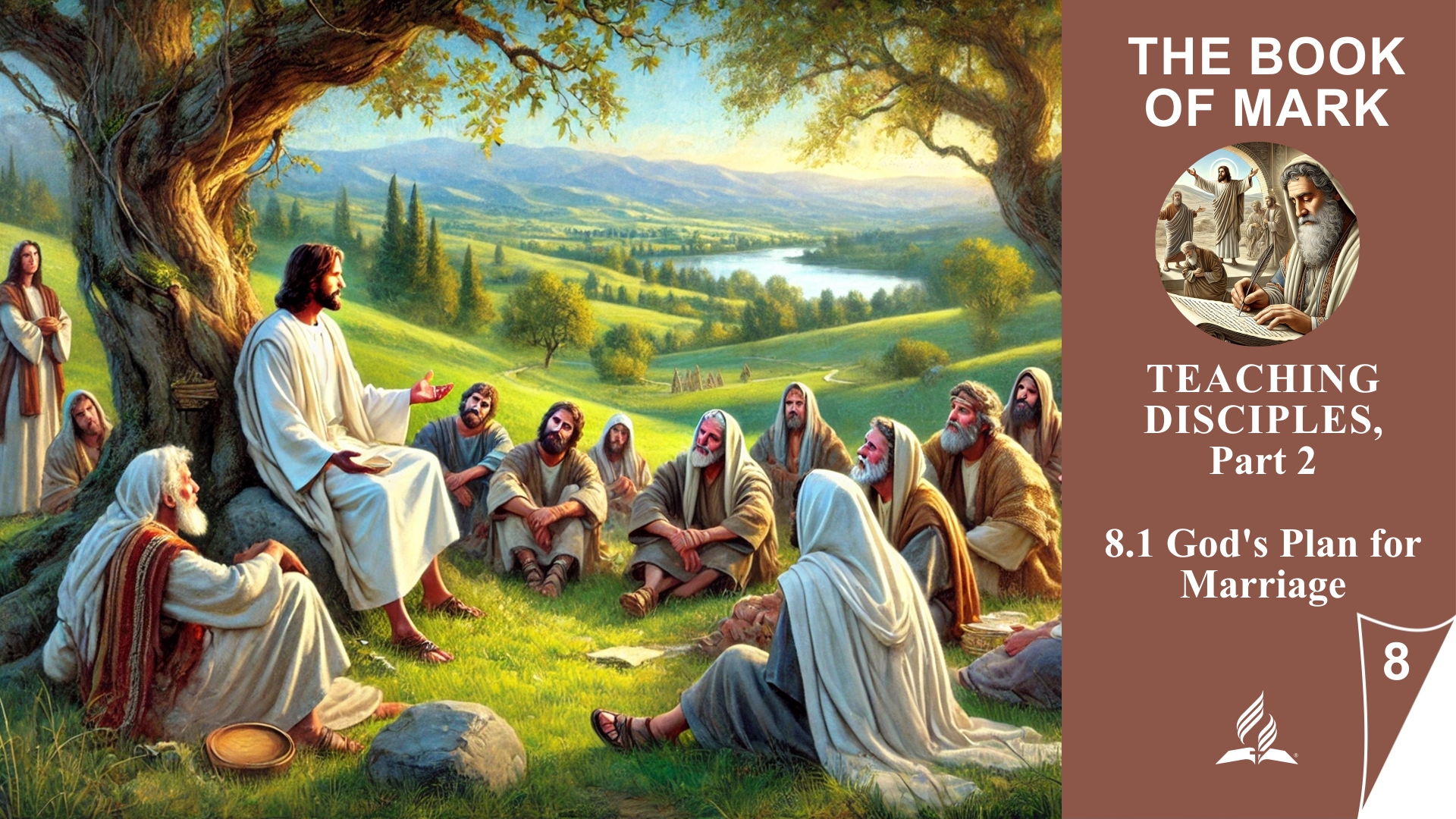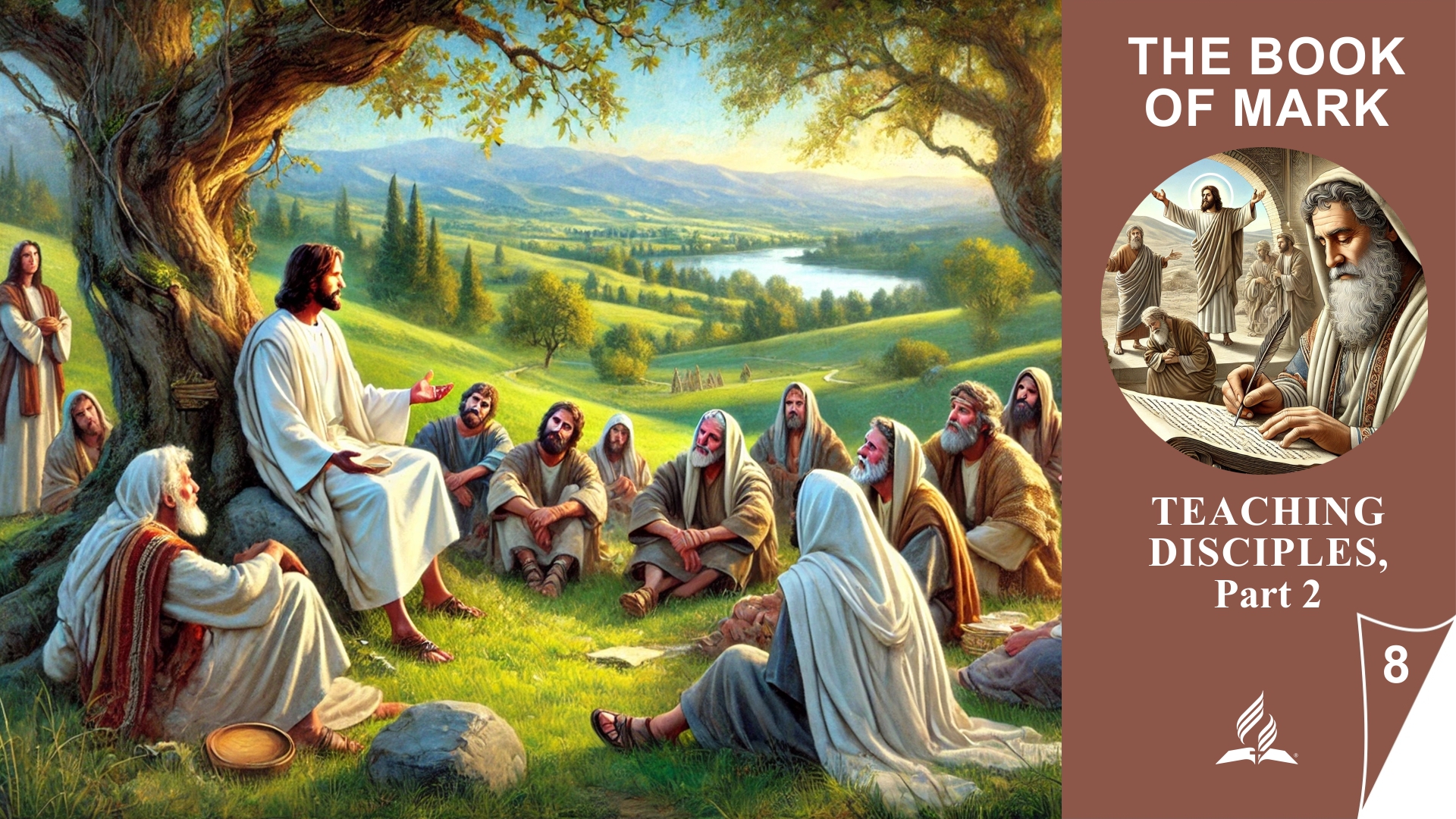


Lesson 8.Teaching Disciples, Part 2
The Challenges and Treasures of Following Jesus
In the continuation of our study on being a disciple, Lesson 8 delves into some of the most challenging and transformative teachings of Jesus. The path of discipleship is not an easy one, and in this lesson, we will see how Jesus prepared his disciples step by step for this journey. It is not just about professing faith but also practically living out that faith in our daily lives—in the relationships, decisions, and priorities we set.
Jesus confronts his disciples with the radical demands of discipleship. Through his teachings and actions, he demonstrates that following him requires sacrifice, humility, and a deep trust in God’s plan. He turns the world’s values upside down by emphasizing that true greatness lies in serving others and that power in the Kingdom of God is understood very differently from the world’s view. This lesson challenges us to question our own notions of success, status, and security and to ask ourselves if we are truly ready to follow Jesus’s path, no matter the cost.
We will see how Jesus speaks about the sanctity of marriage to teach us how deep and unbreakable our commitments should be. He highlights the importance of childlike trust by blessing children and presenting them as role models for faith. Through his encounter with the rich young man, he calls us to examine our attachment to material things and seek the true treasures in heaven. And in the story of Bartimaeus, he shows us what persistent faith can achieve—a faith that, despite all obstacles and adversities, clings to hope and finds healing and salvation.
Lesson 8 invites us to reflect on our own discipleship. Are we ready, like the disciples, to leave everything behind and follow Jesus’s call? Can we, like Bartimaeus, persistently call out to Jesus and trust that he hears us and will lead us on the path to healing? This lesson encourages us to dig deeper to understand the true essence of discipleship—a life wholly oriented towards Jesus, ready to serve, sacrifice, and trust, even when the path is difficult.
In today’s world, which often promotes values quite different from those of the Kingdom of God, this lesson challenges us to make a choice: Will we take the easy path of least resistance, or are we willing to walk the narrow way that leads to true life and deeper fellowship with God? It is a journey that requires courage and perseverance, but the reward is a life that bears fruit eternally.
8.1 God’s Plan for Marriage
God’s Original Plan for Marriage: Indissoluble Unity
Read Mark 10:1–12 and Genesis 1:27; 2:24. What trap was hidden behind the Pharisees’ question about divorce, and what lesson did Jesus teach in his response?
In Mark 10:1–12 and the passages from Genesis 1:27 and 2:24, we find a profound discussion on the topics of marriage and divorce. The Pharisees attempt to trap Jesus with their question about divorce, aiming to involve him in a theological and possibly political controversy. They sought to force him to comment on a highly contentious issue of the time, especially given that Herod Antipas, the ruler of the region, was himself involved in a scandalous divorce and remarriage.
However, Jesus recognizes the trap and responds wisely by directing the Pharisees back to Scripture. Instead of getting entangled in the debate about divorce, he refers to God’s original plan for marriage. By quoting Genesis 1:27 and 2:24, Jesus emphasizes that marriage is a divine institution where a man and woman become an inseparable unit. He reminds them that this unity was created by God himself and should not be separated by human decision.
Jesus’ response highlights the sanctity and indissolubility of the marital bond, presenting a clear deviation from the lax divorce practices of his time. He places God’s original plan above human interpretations and laws, teaching a deeper and more binding view of marriage. In his answer, Jesus shows that it’s not about the legal conditions of divorce but about the original intent and holy nature of marriage as envisioned by God.
What can your church do to strengthen marriages? How can you help those whose marriages have already broken down?
To strengthen marriages within the church, various measures can be taken that encompass both preventive and supportive aspects. Here are some concrete approaches:
-
Offering Marriage Preparation and Counseling:
-
Pre-marital Courses: These courses can help couples lay a solid foundation for their marriage by addressing topics such as communication, conflict resolution, finances, and the significance of faith in marriage.
-
Marriage Counseling: Regular counseling services can assist couples in identifying and resolving issues early, before they escalate.
-
-
Promoting Community and Support:
-
Marriage Groups: Small groups or home groups specifically for married couples can provide a valuable platform for sharing experiences, encouraging each other, and growing together in faith.
-
Couples’ Events: Shared activities like marriage retreats, seminars, or date nights organized by the church can help couples deepen their relationships.
-
-
Prayer and Spiritual Support:
-
Prayer Teams: Special prayer teams could pray for the concerns of married couples and support them in their strengthening.
-
Sermon Series on Marriage and Family: Regular sermons and teachings on biblical principles for marriage can raise awareness in the church about the importance and challenges of the marital bond.
-
-
Helping Broken Marriages:
-
Pastoral Care: Individuals whose marriages are broken often need emotional and spiritual support. Compassionate pastoral care that is accepting and supportive, rather than judgmental, is crucial.
-
Support Groups: Self-help groups for divorced or separated individuals can provide a crucial space for exchange, healing, and encouragement.
-
Practical Help: Assistance with legal and financial issues or practical support in daily life can be of great value to those affected.
-
-
Promoting Forgiveness and Restoration:
-
Restoration Programs: Programs aimed at promoting reconciliation and restoring relationships can help save marriages in difficulty.
-
Teaching on Forgiveness: The church can teach how forgiveness in times of crisis can be a path to healing and possibly restoring a marriage.
-
-
Integration into the Community:
-
Open Arms for Divorced Individuals: It’s important for the church to integrate divorced individuals into the community, showing that they are valued members of the congregation.
-
Ongoing Support: When divorced individuals enter new relationships, the church should also support these new partnerships to avoid further breakups.
-
Through these approaches, the church can create an environment that strengthens marriages and helps those whose marriages have broken down find healing and hope.
The connection between God’s plan for marriage and our daily life and faith is deeply rooted in how we live and nurture relationships. Here are some key aspects of how these principles can impact our daily lives and faith:
-
Understanding Marriage as a Spiritual Covenant:
-
In daily life, the biblical concept of marriage reminds us that our relationships—especially marriage—are not just societal or legal agreements but spiritual covenants. This leads us to treat our spouses with deep respect and commitment that goes beyond personal desires and circumstances. Marriage becomes a place where God’s love and faithfulness are visible.
-
-
Responsibility and Willingness to Sacrifice:
-
Emphasizing the indissolubility of marriage encourages us to take responsibility for the relationship, even when it’s challenging. In our daily lives, this means taking intentional time for our partners, resolving conflicts constructively, and not giving up easily. This attitude of responsibility and sacrifice reflects Jesus’ self-giving love and strengthens faith by teaching us how to love selflessly.
-
-
Forgiveness and Grace:
-
Marriage is a place where forgiveness and grace need to be practiced daily. Adhering to God’s plan for marriage teaches us the importance of forgiving our partner and approaching them with grace. This fosters a culture of forgiveness in our relationships and reminds us of the immeasurable grace we have received from God.
-
-
Witness to Society:
-
A strong marriage grounded in God’s principles serves as a witness to others in our community and beyond. In a time when relationships often seem fragile and unstable, such a marriage can be a light showing the difference faith can make in daily life. This encourages others to seek divine wisdom in their own relationships.
-
-
Support and Community:
-
By supporting marriages and assisting those in difficult relationship situations, the church lives out the community and solidarity to which we as believers are called. It demonstrates that our faith is expressed not only in personal beliefs but also in concrete acts of love and support.
-
-
Healing and Hope:
-
For those whose marriages are broken, faith offers a source of healing and hope. The principles Jesus taught help us to see the light of hope even in the darkest moments. Knowing that God is present in every situation and can bring healing gives strength to move forward and seek a new perspective.
-
These connections between God’s plan for marriage and our daily lives show that faith should not only be a part of our lives but should permeate our entire lives—especially in the relationships that shape us the most. By applying Jesus’ principles to our marriages and relationships, we bring God’s love into the world and create an environment where healing, growth, and genuine community are possible.

Be a light in the world today by radiating love, patience, and kindness in everything you do.
Visited 115 times, 1 visit(s) today








